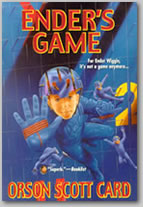“Ender’s Game,” which has sold more than one million copies, is one of the most popular science fiction novels ever written. The book has been equally as popular with non-science fiction readers as with science fiction fans.
According to the New York Times, “intense is the word for ‘Ender’s Game.’ Aliens have attacked Earth twice and almost destroyed the human species. To make sure humans win the next encounter, the world government has taken to breeding military geniuses—and then training them in the arts of war… The early training, not surprisingly, takes the form of ‘games’… Ender Wiggin is a genius among geniuses; he wins all the games… He is smart enough to know that time is running out. But is he smart enough to save the planet?”
Ender’s Game won the Hugo Award in 1985 and the Nebula Award in 1986.
About the Book

Andrew “Ender” Wiggin thinks he is playing computer simulated war games; he is, in fact, engaged in something far more desperate. The result of genetic experimentation, Ender may be the military genius Earth desperately needs in a war against an alien enemy seeking to destroy all human life. The only way to find out is to throw Ender into ever harsher training, to chip away and find the diamond inside, or destroy him utterly. Ender Wiggin is six years old when it begins. He will grow up fast.
But Ender is not the only result of the experiment. The war with the Buggers has been raging for a hundred years, and the quest for the perfect general has been underway almost as long. Ender’s two older siblings, Peter and Valentine, are every bit as unusual as he is, but in very different ways. While Peter was too uncontrollably violent, Valentine very nearly lacks the capability for violence altogether. Neither was found suitable for the military’s purpose. But they are driven by their jealousy of Ender, and by their inbred drive for power. Peter seeks to control the political process, to become a ruler. Valentine’s abilities turn more toward the subtle control of the beliefs of commoner and elite alike, through powerfully convincing essays. Hiding their youth and identities behind the anonymity of the computer networks, these two begin working together to shape the destiny of Earth—an Earth that has no future at all if their brother Ender fails.
Newsday said of this novel “Card has done strong work before, but this could be the book to break him out of the pack.” It was. “Ender’s Game” took the [science fiction] world by storm, sweeping the awards. It won both the Hugo and Nebula, and rose to the top of national bestseller lists.
© 1985 Orson Scott Card
About the Author

Orson Scott Card, an acclaimed science fiction writer, confessed that as a child, he did not consider writing as a career. His first love, then and now, is teaching. Only after majoring in theater in college and traveling to Brazil as a missionary did his literary side awaken, eventually leading him to become a New York Times best-selling author.
Card was the first writer to receive both the Hugo and Nebula awards for best novel two years in a row, first for “Ender’s Game” and then for the sequel, “Speaker for the Dead.” His ‘Ender’s Cycle’ has successfully crossed genre lines by creating a sense of wonder that pulls in readers of all ages and from all walks of life. Other popular series by Card include, “The Homecoming Saga” and “The Tales of Alvin Maker,” as well as the individual title, “Pastwatch” where Card retells ancient scripture as science fiction.
Born in Richland, Washington in 1951, Card spent his youth growing up in California, Arizona and Utah. He received degrees from Brigham Young University and the University of Utah. Card currently lives in Greensboro, North Carolina with his wife and children.
Orson Scott Card Selected Bibliography
Series:
Tales of Alvin Maker
Homecoming
Mayflower (with Kathryn H. Kidd)
Women of Genesis
Ender’s Cycle:
Ender’s Game (Tor, Jan. 1985) Nebula Award 1985, Hugo Award 1986
Speaker for the Dead (Tor, Feb. 1986) Nebula Award 1986, Hugo Award 1987
Xenocide (Tor, Aug. 1991)
Children of the Mind (Tor, 1996)
Ender’s Shadow (Tor, August 1999)
Shadow of the Hegemon (Tor, Jan. 2001)
Shadow Puppets (Tor, Aug. 2002)
Shadow of the Giant (Tor, 2005)
Other Novels Include:
Enchantment (Del Rey, 1999)
Homebody (HarperCollins, 1998)
Stone Tables (Deseret Book, 1997)
Treasure Box (HarperCollins, 1996)
Pastwatch: The Redemption of Christopher Columbus (Tor, 1996)
Lost Boys (HarperCollins, 1992)
Treason (St. Martin’s Press, Oct. 1988)
Wyrms (Arbor House/Tor, Jun. 87)
The Worthing Chronicle (Ace, Jul. 1983)
Hart’s Hope (Berkley, Jan. 1983; Tor, Feb. 1988)
Songmaster (Dial/Dell, 1979)
Card has also written numerous short stories, essays, technical writing, plays and poetry.
